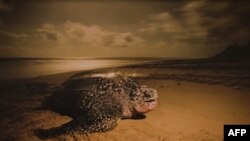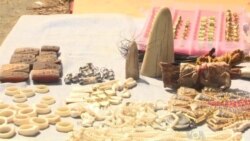LONDON —
The global trade in ivory and rhino horn is at the top of the agenda at the Convention on International Trade in Endangered Species, or CITES conference, taking place in Bangkok. The conference is debating imposing bans on all wildlife trade in 19 countries unless they crack down on the poaching, smuggling or sale of illegal ivory.
Poaching for rhino horn and ivory has soared in recent years. Among the participants at the 178-nation CITES conference in Thailand is Will Travers of conservation group Born Free.
"In 2007 there were 13 rhino poached in South Africa. Last year there were 668 and this year, 130 already," he explained.
Related video report by Steve Sandford
Elephant poaching is also on the increase. Campaigners say a ban on international ivory trading signed in 1989 has been weakened and undermined.
Kenya is one of the countries pushing for a crackdown on the illegal ivory trade in Asia. In the shadow of Mount Kilimanjaro, Steve Njumbi manages conservation programs with the International Fund For Animal Welfare.
"There is a misconception amongst most of those who demand or want to use the ivory, that ivory falls off the animal just like hair does. Message to them: people in China, people in Thailand: an elephant must die violently, very very violently," Njumbi said.
Charlotte Davies of the Environmental Investigation Agency based in London, says 35,000 elephants a year are being killed for their tusks, mostly by organized criminals.
"There's an international ban on the trade in ivory, but there were two one-off legal sales, one in 1999 and one in 2008. And in China for example, there is a domestic legal ivory market. But this isn't very well policed, it's not well enforced, there are loopholes," she noted. "And it means that illegally acquired ivory, that's ivory from poached elephants, can be laundered into that system."
Critics say those one-off sales simply fueled demand in Asia. The Environmental Investigation Agency says its research suggests 90 percent of the ivory traded in China is illegal.
"What EIA is saying at CITES is close down all markets. And stop confusing people who think they can buy ivory legally, when in fact it's posing a threat to the elephants on the ground," said Charlotte Davies.
Britain's Prince William has joined the calls for immediate action against poaching - sending a video message to delegates at the Thailand conference.
"We must do more to combat this serious crime if we are to reverse the current alarming trends," he said. "If not, we can cease to see some populations of these creatures or even an entire species disappear from the wild."
Campaigners warn extinction is a real possibility unless a global agreement banning the trade is signed and enforced.
Poaching for rhino horn and ivory has soared in recent years. Among the participants at the 178-nation CITES conference in Thailand is Will Travers of conservation group Born Free.
"In 2007 there were 13 rhino poached in South Africa. Last year there were 668 and this year, 130 already," he explained.
Related video report by Steve Sandford
Elephant poaching is also on the increase. Campaigners say a ban on international ivory trading signed in 1989 has been weakened and undermined.
Kenya is one of the countries pushing for a crackdown on the illegal ivory trade in Asia. In the shadow of Mount Kilimanjaro, Steve Njumbi manages conservation programs with the International Fund For Animal Welfare.
"There is a misconception amongst most of those who demand or want to use the ivory, that ivory falls off the animal just like hair does. Message to them: people in China, people in Thailand: an elephant must die violently, very very violently," Njumbi said.
Charlotte Davies of the Environmental Investigation Agency based in London, says 35,000 elephants a year are being killed for their tusks, mostly by organized criminals.
"There's an international ban on the trade in ivory, but there were two one-off legal sales, one in 1999 and one in 2008. And in China for example, there is a domestic legal ivory market. But this isn't very well policed, it's not well enforced, there are loopholes," she noted. "And it means that illegally acquired ivory, that's ivory from poached elephants, can be laundered into that system."
Critics say those one-off sales simply fueled demand in Asia. The Environmental Investigation Agency says its research suggests 90 percent of the ivory traded in China is illegal.
"What EIA is saying at CITES is close down all markets. And stop confusing people who think they can buy ivory legally, when in fact it's posing a threat to the elephants on the ground," said Charlotte Davies.
Britain's Prince William has joined the calls for immediate action against poaching - sending a video message to delegates at the Thailand conference.
"We must do more to combat this serious crime if we are to reverse the current alarming trends," he said. "If not, we can cease to see some populations of these creatures or even an entire species disappear from the wild."
Campaigners warn extinction is a real possibility unless a global agreement banning the trade is signed and enforced.






